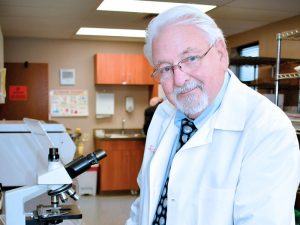The Mayo Clinic Staff has written about the clinical research that has investigated the efficacy of adjuvant CoQ10 treatment of heart conditions, diabetes, statin-induced myopathy, migraines, and physical performance [Ref 1]. In this review article, we summarize overview articles that evaluate the recent research conducted on the effects of CoQ10 deficiency and CoQ10 supplementation in less common disorders.
Autoimmune disorders

Dr. William Judy, 1938-2022, did extensive research into the absorption and bioavailability of CoQ10 supplements and into their effect on heart failure and low-energy syndrome disorders. His Insider’s Guide to Coenzyme Q10 book is available from amazon.com. ISBN: 978-87-7776-186-7.
Mantle & Hargreaves note that mitochondrial dysfunction, oxidative stress, and inflammation are characteristic of many autoimmune diseases. Coenzyme Q10 has a bio-energetic role in normal mitochondrial function and has antioxidant and anti-inflammatory effects; consequently, there is a rationale for using CoQ10 supplementation in the management of autoimmune disorders. In this overview article, Mantle & Hargreaves review the potential role of both CoQ10 deficiency and CoQ10 supplementation in a number of autoimmune disorders: fibromyalgia, Graves’ disease, multiple sclerosis, rheumatoid arthritis, ulcerative colitis, and more [Ref 2].
Post-viral fatigue syndrome
Post-viral fatigue syndrome (PVFS) is an umbrella term for a variety of neuroimmune disorders of unknown causes. Chronic fatigue syndrome, fibromyalgia, and long COVID are examples of PVFS. Fatigue following exertion, muscle and joint pain, cognitive impairment, unrefreshing sleep, and neuropsychiatric symptoms are characteristic of PVFS. There is generally a lack of effective treatments for PVFS.
The mitochondria are the organelles in the cells that are responsible for tissue energy generation. The central role of the mitochondria in cellular bioenergetic metabolism and the role of Coenzyme Q10 in ATP energy generation in the mitochondria are the focus of this overview article. There seems to be an association between mitochondrial dysfunction and low-grade systemic inflammation in chronic fatigue syndrome, fibromyalgia, and long COVID. Mantle et al review the evidence that links mitochondrial dysfunction to the pathogenesis of these disorders and evaluate the effectiveness of CoQ10 supplementation on chronic fatigue and pain symptoms [Ref 3].
Secondary CoQ10 deficiency
Primary CoQ10 deficiencies are rare disorders that result from mutations in the genes directly involved in the biosynthesis of Coenzyme Q10. Secondary CoQ10 disorders are more common. Typically, secondary CoQ10 disorders result from 1) mutations in genes not directly related to the biosynthetic pathway, 2) oxidative stress induced CoQ10 depletion, and 3) the effects of medications such as statins and nitrogen-bisphosphonates.
In this overview article, Mantle et al review the evidence of secondary CoQ10 deficiency in various disorders. They discuss the disorders in which CoQ10 supplementation can be of significant clinical benefit, e.g., diabetes, heart failure, kidney disease, and liver disease [Ref 4].
Coenzyme Q10 and selenium and COVID
Hargreaves & Mantle stress that, in COVID-19 infections, there is a need for a strong immune response to the SARS-CoV-2 virus that does not precipitate a cytokine storm. The cytokine storm can cause lung damage and respiratory distress. To an extent, the patients’ nutritional status will affect the immune response and the subsequent inflammation. In this overview article, Hargreaves & Mantle review the relationship between the two micronutrients, Coenzyme Q10 and selenium, and the effect on oxidative stress and inflammation in viral infections. They conclude that both substances merit a trial in the treatment of patients with COVID-19 disease [Ref 5].
Coenzyme Q10 and fibromyalgia
The cause of the chronic pain condition called fibromyalgia is not known. However, mitochondrial dysfunction, oxidative stress, and inflammation have all been implicated in the development and progression of fibromyalgia. Restoring a deficiency in Coenzyme Q10 status through daily CoQ10 supplementation may provide symptomatic relief. Hargreaves & Mantle suggest that Coenzyme Q10 can improve mitochondrial activity, restore cellular antioxidant capacity, and alleviate systemic inflammation [Ref 6].
Coenzyme Q10 metabolism
Coenzyme Q10 plays a central role in in human cells, both in the mitochondria and outside the mitochondria. In brief, Coenzyme Q10 status affects ATP energy generation, antioxidant protection in fatty acid, pyrimidine, and lysosomal metabolism, and mediation of inflammatory processes. Accordingly, CoQ10 deficiency is associated with several disorders. In this overview article, Hargreaves et al review the clinical manifestations of primary and secondary CoQ10 deficiencies. They provide examples of the successful CoQ10 supplementation in the treatment of disease [Ref 7].
Coenzyme Q10 and selenium and critically ill patients
In critically ill patients, the danger is multiple organ dysfunction followed by death. Impaired cellular energy supply and oxidative stress play a role in the progression of critical illness. Coenzyme Q10 with its essential roles in cellular energy supply and as an antioxidant and selenium with its role as a co-factor in antioxidant enzymes have a special biological interrelationship that may be beneficial in the treatment of critical illness [Ref 8].
Coenzyme Q10 in fibrosis and ageing
In this overview article, Hargreaves & Mantle review the role of CoQ10 supplementation in the treatment of tissue fibrosis. Fibrosis has been linked to age-related loss of function in various organs including the heart. CoQ10 supplementation may decrease the level of fibrosis in the heart muscle. The exogenous supply of Coenzyme Q10 would improve heart muscle function and would reduce the risk of death from heart disease. The antioxidant and anti-inflammatory functions of Coenzyme Q10 may be major factors in CoQ10 treatment of this fibrosis [Ref 9].
Unresolved issues in CoQ1o research
In this overview article, Mantle, Lopez-Lluch, and Hargreaves review the biomedical literature about the following unresolved CoQ10 research issues [Ref 10]:
- Improving the bioavailability of CoQ10 supplements?
- Administering intravenously or via alternative routes?
- Coenzyme Q10 capable of crossing the blood-brain barrier?
- Transporting exogenous Coenzyme Q10 into and within the target cells and tissues?
- Explaining why some clinical trials of CoQ10 supplementation have not yielded the expected results
- Determining which tissue is most appropriate for the clinical assessment of CoQ10 status?
Conclusion: State-of-the-art reviews of CoQ10 clinical research
The main focus of CoQ10 clinical research has been the effect of adjuvant treatment of cardiovascular diseases, metabolic disorders, statin-induced myopathies, and migraines [Ref 1].
Above, we summarize the contents of overview articles written by Mantle and Hargreaves and fellow researchers on the effect of CoQ10 deficiency and supplementation in disorders less commonly treated with Coenzyme Q10 [Refs 2-9].
Important research questions still to be answered include how to improve the absorption and bioavailability of oral CoQ10 supplements and how to get exogenous Coenzyme Q10 to cross the blood-brain barrier.
Sources
1. Mayo Clinic Staff. Coenzyme Q10. 2023. Retrieved from https://www.mayoclinic.org/drugs-supplements-coenzyme-q10/art-20362602
2. Mantle D, Hargreaves IP. Coenzyme Q10 and autoimmune disorders: an overview. Int J Mol Sci. 2024 Apr 22;25(8):4576.
3. Mantle D, Hargreaves IP, Domingo JC, Castro-Marrero J. Mitochondrial dysfunction and Coenzyme Q10 supplementation in post-viral fatigue syndrome: an overview. Int J Mol Sci. 2024 Jan 1;25(1):574.
4. Mantle D, Turton N, Hargreaves IP. Depletion and supplementation of Coenzyme Q10 in secondary deficiency disorders. Front Biosci (Landmark Ed). 2022 Dec 19;27(12):322.
5. Hargreaves IR, Mantle D. COVID-19, Coenzyme Q10 and Selenium. Adv Exp Med Biol. 2021;1327:161-168.
6. Hargreaves IP, Mantle D. Targeted treatment of age-related fibromyalgia with supplemental Coenzyme Q10. Adv Exp Med Biol. 2021;1286:77-85.
7. Hargreaves I, Heaton RA, Mantle D. Disorders of human Coenzyme Q10 metabolism: an overview. Int J Mol Sci. 2020 Sep 13;21(18):6695.
8. Hargreaves IP, Mantle D. Supplementation with selenium and Coenzyme Q10 in critically ill patients. Br J Hosp Med (London). 2019 Oct 2;80(10):589-593.
9. Hargreaves IP, Mantle D. Coenzyme Q10 supplementation in fibrosis and aging. Adv Exp Med Biol. 2019;1178:103-112.
10. Mantle D, Lopez-Lluch G, Hargreaves IP. Coenzyme Q10 metabolism: a review of unresolved issues. Int J Mol Sci. 2023 Jan 30;24(3):2585.
The information provided in this review article is not intended as medical advice. It should not be used as such.









Leave A Comment